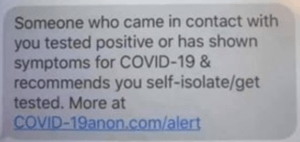Please be advised that scammers seeking to steal your sensitive information or your stimulus relief may pose as Treasury, IRS or CDC officials and may request confirmation of your personal identifying information (PII) in connection with an update or the receipt of your benefits. These communications are commonly delivered via phone calls (robocalls and person to person calls), emails, or via SMS text messages. Electronic messages will likely provide links to fraudulent websites designed to steal your PII and other sensitive information.
The following is an example of a COVID-19 scam SMS text message.
Additionally, the FTC advises:
- Ignore online offers for vaccinations and home test kits as there are no proven treatments or vaccinations at this time.
- Beware of messages which claim to be from the CDC or WHO. Instead, visit coronavirus.gov for updates.
- Donate wisely to known charities. Do not donate cash, gift cards or wire money.
- The IRS will not provide you with an overpayment, and seek repayment in cash, gift cards or a monetary transfer.
Reminders & Recommendations:
- Never provide sensitive information to a caller or over email/text.
- Remember that phone numbers and email addresses can be spoofed, so a communication may appear to be coming from a legitimate source when it’s not.
- When in doubt, confirm by contacting the sender/caller at trusted phone number that you obtained via an organizational website.
- Do not click embedded links or open attachments in email you were not expecting to receive.
Resources:
- https://www.irs.gov/coronavirus/economic-impact-payment-information-center
- FTC: Coronavirus checks: flattening the scam curve
- NYU IT Security News & Alert Blog, The Ins & Outs of Text Message Phishing
- The Download, Phishing, Spear Phishing, and Whaling
